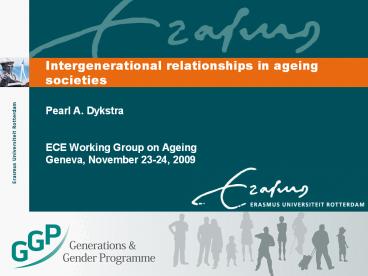Intergenerational%20relationships%20in%20ageing%20societies - PowerPoint PPT Presentation
Title:
Intergenerational%20relationships%20in%20ageing%20societies
Description:
long parental leaves further polarize women of different social classes ... regimes that do not reinforce social class inequalities and gender inequalities? ... – PowerPoint PPT presentation
Number of Views:162
Avg rating:3.0/5.0
Title: Intergenerational%20relationships%20in%20ageing%20societies
1
Intergenerational relationships in ageing
societies
- Pearl A. Dykstra
- ECE Working Group on Ageing
- Geneva, November 23-24, 2009
2
Three key premises
- population ageing affects people of all ages
- there are critical interdependencies between
family generations and between men and women
which are built and reinforced by social policies - to understand intergenerational
interdependencies, a range of levels must be
distinguished and recognized
3
Findings from
- Generations and Gender Programme (ggp-i.org)
- MULTILINKS, an FP-7 project focusing on multiple
linkages in families, across time, and across
levels (multilinks-project.eu )
4
Demography of intergenerational family
relationships
- three-generation families are the norm
5
Mean number of family generations, GGP countries
6
Demography of intergenerational family
relationships
- three-generation families are the norm
- opposing effects of increased longevity and
postponed childbearing
7
Mean number of ascending family generations, GGP
countries
8
Mean number of descending family generations, GGP
countries
9
Interdependencies between older and younger
family members
- family obligation norms tend to be weaker in
generous welfare states
10
Children should take responsibility for caring
for their parents when their parents are in need
GGP-countries
11
Children should adjust their working lives to the
needs of their parents
GGP-countries
12
Interdependencies between older and younger
family members
- family obligation norms tend to be weaker in
generous welfare states - intergenerational support flows primarily
downward - little empirical support for the view that public
transfers crowd out family transfers in Western
welfare systems (complementarity rather than
substitution) - paucity of data on non-Western countries
13
adults providing personal care to parents,
GGP-countries
14
adults providing emotional support to parents,
GGP-countries
15
Question for discussion
- Can national policies make caring men?
16
Gendered intergenerational regimes, four patterns
- familialism by default no publicly provided
alternatives to family care and financial support - supported familialism policies support families
in keeping up their financial and caring
responsibilities - optional familialism some kind of option is
given between being paid to provide care or to
use publicly supported care - defamialization care and financial needs are
partly answered through public provision
17
Question for discussion
- What kinds of interdependencies between family
generations and between men and women in families
are built and reinforced by the legal and policy
arrangements in your country?
18
Beyond the public/private responsibilities
dichotomy
- generous parental leaves support parental care
- a fathers quota supports the caring role of men
- child care services lighten parental
responsibilities - at-home, day care or institutional services for
the frail elderly partly substitute family care - earmarked payments for care also partly
substitute family care - not earmarked payments for care support family
care, but also encourage recourse to the market
19
Question for discussion
- Should national governments aiming to help
families with intergenerational care needs be
encouraged to provide care services, income
transfers or a mix of the two?
20
Legal and policy arrangements are not neutral
- long parental leaves tend to strengthen the
gendered nature of family care - long parental leaves further polarize women of
different social classes - a reserved fathers quota can help de-gender
family care - good quality child care services are not only a
conciliation measure but also a resource for
children themselves - over-reliance on family care for frail older
persons crystallizes the gender division of
labour
21
In summary
- Exclusive or primary reliance on the family
- brings risks for the well-being of frail older
persons - strengthens socioeconomic inequalities between
families, and - jeopardizes womens economic independence
- Insufficient economic independence among women
implies - limited pensions for women , and
- poorer life chances for children
- It is important to consider the prospects of
future generations - of pensioners (which include women), and
- of workers (todays children)
22
Question for discussion
- How can national policies develop
intergenerational regimes that do not reinforce
social class inequalities and gender inequalities?
23
(No Transcript)































